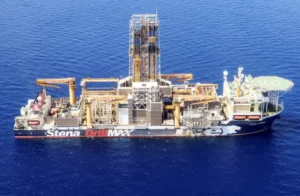The IDF intercepted three drones launched by Hezbollah toward the Karish gas field, which lies in disputed territorial waters.

The Israel Defense Forces said on Saturday that it shot down three drones launched by Hezbollah toward Israel’s Karish offshore gas field.
One of the unmanned aerial vehicles was downed by an F-16 Israeli fighter Jet, and the other two were intercepted by Barak 8 missiles launched from the Israel Navy’s Saar 5-class corvette INS Eilat, Israel’s military said in a statement.
A new drilling platform arrived at the Karish site to produce gas for Israel just weeks before the incident, to start gas extraction operations in the Karish gas field, which lies in disputed territorial waters between Israel and Lebanon. Israel says that the gas field is inside its United Nations-recognized exclusive economic zone, while Lebanon claims rights to those territorial waters.
Hezbollah said in a statement that the drones did their job. “On Saturday afternoon, three unarmed drones were launched toward the disputed Karish field for reconnaissance missions. The mission was accomplished,” according to the statement.
“The immediate objective should be to prevent the enemy from extracting oil and gas from the Karish gas field,” Hezbollah leader Hassan Nasrallah said in a televised statement.
One small step for a drone
Itzik Huber, CEO of SKYLOCK – C-UAS Systems, Avnon HLS Group, an Israeli anti-drone solutions company, told The Media Line that “even little drones, or any UAS, can carry sophisticated explosives and, by a direct and well-planned attack, they can make a large and effective impact on the gas platform.”
Huber explained that drones are a unique threat, since they are easy to operate but very difficult to identify and effectively neutralize. “The unique mode of operation requires special counter-drone solutions when facing drones’ full capabilities,” he added.
The drones were downed by Israeli security forces “at a safe distance” from the gas vessel, according to the IDF spokesperson.
“The detection and warning systems worked as they were meant to do and realized the multi-layer air defense concept in the best possible way, through professional conduct by the personnel at sea and in the air, who completed the defense operation with great success,” continued the IDF spokesperson.
You don’t necessarily need explosives to convey a message
Dr. Barak Bouks, a senior research fellow at The Europa Institute and lecturer at the School of Communications & Department of Political Studies at Bar-Ilan University, told The Media Line that he believes the drones were launched by Hezbollah in order to send a message.
“Hezbollah wanted the drones to be discovered in order to prove a point, that Hezbollah needs to be taken into consideration while any negotiations are being held”
Dr. Barak Bouks
He noted that, according to Lebanon 24, which he describes as a prominent Lebanese website, “Hezbollah wanted the drones to be discovered in order to prove a point, that Hezbollah needs to be taken into consideration while any negotiations are being held.”
Hezbollah defines itself as the “defenders” that defend Lebanon’s honor, Lebanese territory and Lebanese dignity, he explained.
In order to do so, continued Bouks, “they’re proving a point that if they want, they can damage the Karish gas platform.”
Israel and Lebanon have not yet agreed on their maritime borders.
US Envoy for Energy Affairs Amos Hochstein has visited Israel and Lebanon several times in recent weeks seeking to bring the countries to an agreement on their maritime frontiers.
On Monday, the administration of US President Joe Biden announced that progress has been made on the issue.
Bouks highlighted another related development. After Hochstein’s June 13 visit to Lebanon, where he met with Lebanon’s caretaker Minister of Energy and Water Walid Fayad and American Ambassador to Lebanon Dorothy Shea, an agreement on relaying electricity from Jordan and Egypt to Lebanon was reached.
Later, Lebanese national radio reported that Lebanon’s President Michel Aoun would be willing to compromise to reach an agreement with Israel on the maritime border between the two countries, he continued.
“I assume that the signature of the electricity agreement from June 13th is the preliminary good sign of arriving at some sort of an agreement on the maritime border,” Bouks said.
He added that Hezbollah opposes any agreement with Israel concerning maritime borders. However, he noted that the Lebanese government needs the agreement in order to save the country’s economy.
Bouks explained that, in the last two years, Lebanon’s situation has been deteriorating. In March 2020, the COVID-19 pandemic began and, a few months later, the deadly explosion in Beirut port took place. Currently, due to the country’s severe economic crisis, Beirut, which was once called the city of lights, now has almost no electricity.
“The situation is very bad, and Lebanon is on the verge of bankruptcy,” he said.
The United States has offered Lebanon several solutions to deal with its economic crisis.
“Lebanon has to sign it (the maritime border deal) immediately if it wants to survive economically. But as you can see, they’re dragging it on and on because of Hezbollah,” according to Bouks.
He added that Hezbollah is opposed to an agreement for several reasons. One reason is that the international loan money would not go to the Bank of Lebanon, but rather to a special international auditor.
With a Western body controlling the money, explained Bouks, “Hezbollah cannot put its ‘hands’ on it.”
Another main reason is that companies that are interested in submitting bids for the operation of the Lebanese gas extraction platform have expressed that one of their terms is that an agreement with Israel be reached in order to make sure that their investment won’t be damaged by war.
According to Bouks, if gas starts flowing in Lebanon, then the chance of waging a war for Hezbollah or Iran will be smaller than usual.
